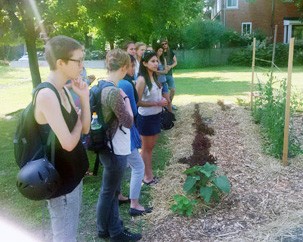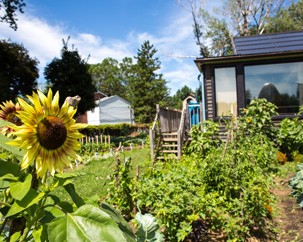For many, the idea of travelling 5,800 kilometres to stand in the middle of a compost site wouldn’t spark much enthusiasm. But for the six students at Concordia on exchange from the Fulda University of Applied Sciences in Fulda, Germany, spending their summer vacation learning about sustainability was a dream come true.
In the first year of the exchange’s pilot project, students from Concordia’s Loyola College for Diversity and Sustainability travelled to Germany to learn about sustainable practices and partner with other international students to author a joint report.
Concordia returned the favour this year by hosting the Fulda students for a three-week intensive process, where they had the opportunity to experience some hands-on learning.
Rosemarie Schade, principal of the Loyola College for Diversity and Sustainability and an associate professor in Concordia’s Department of History, explains that she wanted to facilitate experiential learning by taking the students on trips.
“They actually get to go and visit some of the things they read about,” Schade says.
During their stay, the students visited Compost Montréal, La Ruche d’Art (Art Hive) in St. Henri district and the Loyola Campus garden, where they discussed the challenges of urban agriculture projects in a city the size of Montreal.
They also connected with a number of on- and off-campus groups, such as Sustainable Concordia and Incredible Edibles in the Notre-Dame-de-Grâce district.


 The exchange students from Fulda University of Applied Sciences stopped by the Loyola Campus garden in August. | Photo by Marilla Steuter-Martin
The exchange students from Fulda University of Applied Sciences stopped by the Loyola Campus garden in August. | Photo by Marilla Steuter-Martin
